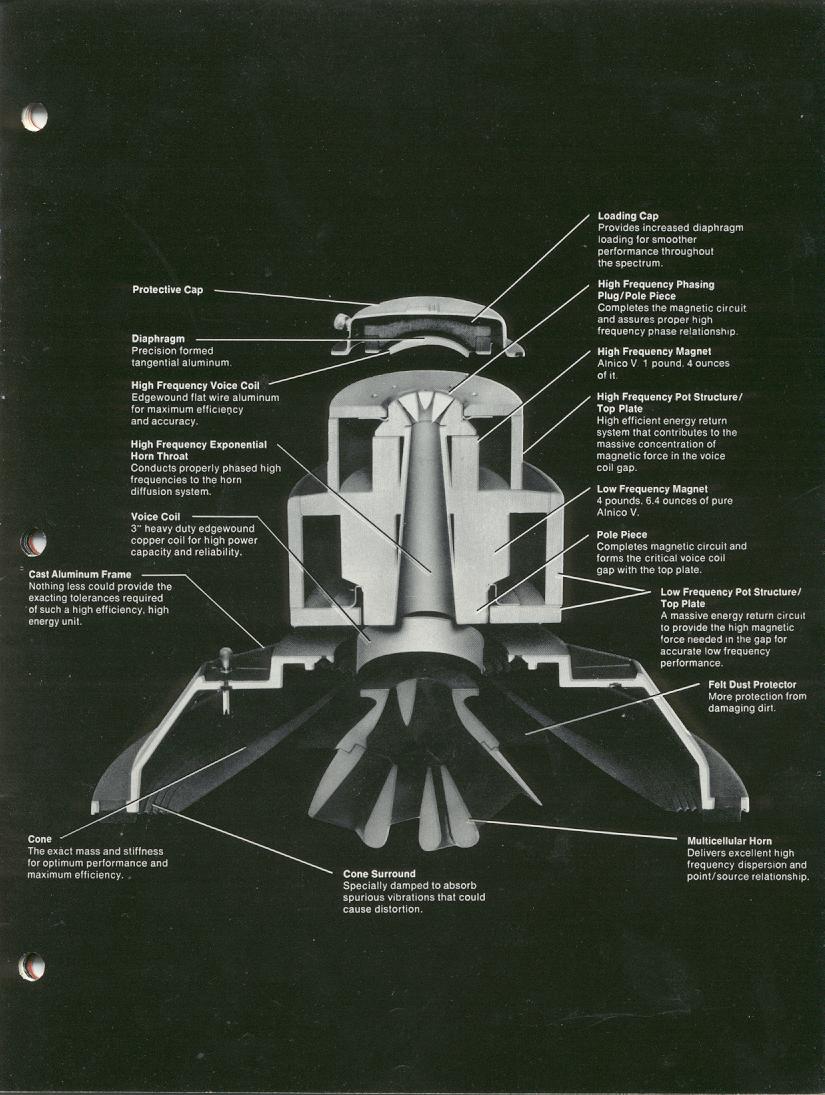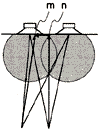兩聲道
CD機 | MD機 | SACD機 | DAC | CAS | 合拼擴音機 | 前級擴音機 | 後級擴音機 | 接線 | 喇叭線 | 揚聲器 | 耳機 | 耳機擴音機 | LP產品 | 膽機產品 | 開卷式錄音機 | 音響配件 | DIY音響 | 電源 | 家庭影院
電視機 | 投影機 | 錄影機 | DVD影碟機 | Blu-ray影碟機 | 多媒體播放器 | 機頂盒 | 多聲道擴音機 | 多聲道揚聲器 | 多聲道影音組合 | Mini音響組合 | 重低音揚聲器 | 輔助設備 | 同好會
同好會 | Accuphase | B&W | Burmester | Denon | Jadis | KEF | KRELL | Luxman | Marantz | Nuforce | OPPO | Pioneer | TEAC | WEISS | News
News | Blog | 其他
其他 | 所有 |
| 影音天地主旨 ﹝請按主旨作出回應﹞ 上頁 下頁 首頁 尾頁 | 寄件者 | 傳送日期
|
| [#21] 喇叭原理分享篇(高中音偏軸設計) 孟波兄 i wonder..how's those phases divided into those 4 bass drivers... seem there are a few possible way to do that..http://www.reyaudio.com/warp-e.html wish you may give me some idea.. many thxxxxxxx |
hahayanyan 119.xxx.xxx.190 |
2011-12-03 00:42 | |
|
|
|||
| [#22] 喇叭原理分享篇(高中音偏軸設計) >B&W 801 is more simple , instead of using a single front baffle, it aligns it's mid-range and tweeter behinds the woofer box. I have to mention that Tannoy is smarter , it's treble diaphram is already aligned to the back of the magnet , the voice-coil distance to the woofer's already compensated the phase forwarded on the High-pass. >孟波兄及diytfy兄 I have a question. Is it just an approximation when the manufacturer choose the tweeter/woofer phase compensation distance? I think the phase delay for a certain filter network is frequency dependent throughout the handling freq range of the tweeter. Is there any article describing how companies like Tannoy came up with this compensation distance for their coaxial drivers? Btw, is this compensation distance kept constant throughout the history of Tannoy (Black,Silver,Red,Gold....etc)? |
kslsfz 173.xxx.xxx.196 |
2011-12-03 02:25 |
| [#23] 喇叭原理分享篇(高中音偏軸設計) from my point of view..coaxial compensation distance having 2 majors factors..i guess ( correct me if i am wrong , as i am a new learner for this area) 1) we shall need to define the level concave of the bass unit, there may be a few different feasible shape , more concave..less concave..a bit deeper, etc..theoretically, there will be a focal point which is in between the front edge of the driver and the bottom edge, well seem to be some where below the middle 2) for the tweeter..we may need to get the upper and lower frequency wavelength and from some sort of calculation...we get the overall "Mean" wavelength so by a lot of trial error calculations ( nowadays..trial and error calculation is much easy..) we may find a distance which match the Shape of the bass driver and a multiple of those average wavelength..etc.. if not...we shall need to go back to modify the shape of the bass driver a little bit..and try again.. shall more than one close to matching combinations, and expected it will not be perfect, however these imperfection can be addressed by crossover from the speaker cookbook, basically..there is some chapter about how we align the front to back distance of those drivers too http://www.reyaudio.com/large-e.html this speaker they divide the upper phase and lower phase into the top and bottom bass driver and have a horn tweeter in the middle, basically they try to create a Coaxial effect like to learn more from here and from 孟波 c hing..haha..i want to build my own speaker |
hahayanyan 119.xxx.xxx.190 |
2011-12-03 11:00 |
| [#24] 喇叭原理分享篇(高中音偏軸設計) hahayanyan兄: 兩日冇上網,等小弟消化下先再討論。^^ kslsfz兄: 我在其他thread看見你的留言,你是高手一名,多謝共同分享見解和討論。 最後修改時間: 2011-12-03 11:50:11 |
孟波 123.xxx.xxx.186 |
2011-12-03 11:45 |
| [#25] 喇叭原理分享篇(高中音偏軸設計) 先回應kslsfz兄: 小弟和你的看法一樣,分音器造成的相位偏移是和頻率成比例,以圖1st order low pass filter 作例子,在-3dB分頻時的相移是45度,在分頻點之前未有濾波作用時相位近乎無影響,越往較高頻率相位偏移越大。 我的看法是所謂相位補償只是針對分頻點時的頻率,分頻點以外的頻率是無能為力。 有個所謂高音速度比低音行得快,所以如thiel 的喇叭作後部傾斜作補償既說法,我個人也是不認同。 Thiel是補償單元音圈的垂直發聲位置,使分頻點時兩單元的聲軸是向前而非向下,以高音單元工作是3500Hz~20000Hz計,如果以3500Hz作準,那20000Hz是否快了?如何補償?  最後修改時間: 2011-12-03 12:21:59 |
孟波 123.xxx.xxx.186 |
2011-12-03 12:19 |
| [#26] 喇叭原理分享篇(高中音偏軸設計) 唔見左張圖,再試。  |
孟波 123.xxx.xxx.186 |
2011-12-03 12:23 |
| [#27] 喇叭原理分享篇(高中音偏軸設計) 說回Tannoy,它的同軸設計將高音音圈放在低音音圈後,恐怕未必是考慮補償高音和低音的相位差,而是結構上使然。 反而KEF 的Uni-Q就有考慮高音和低音音圈的發聲點距離,故意造在同一直線位。 link:http://www.audionet.com.tw/doc/view/sn/5258 |
孟波 123.xxx.xxx.186 |
2011-12-03 12:42 |
| [#28] 喇叭原理分享篇(高中音偏軸設計) 第一代Urei是採用Altec 604同軸單元強調time aligned設計的monitor喇叭,也是針對分頻點時高音/低音音圈位置差別而作time aligned,而且是delay低音部分。  |
孟波 123.xxx.xxx.186 |
2011-12-03 12:50 |
| [#29] 喇叭原理分享篇(高中音偏軸設計) 外國Tannoy fans 都有資料關於 time delay for K3808 driver. http://www.hilberink.nl/codehans/tannoy34.htm  最後修改時間: 2011-12-03 14:03:18 |
孟波 123.xxx.xxx.186 |
2011-12-03 14:00 |
| [#30] 喇叭原理分享篇(高中音偏軸設計) >>>>>>>>i wonder..how's those phases divided into those 4 bass drivers... seem there are a few possible way to do that..http://www.reyaudio.com/warp-e.html>>>>>>>>>>>>>>>>>>>>> hahayanyan兄: reyaudio的做法大致上等於toe-in低音,其附圖已經說明了其目的,我的見解是有可能的。 或者我們先把V-4的低音以全音域喇叭看待,就以右聲道作例子。 先看傳統平面橫裝的AB兩個單元(圖左),兩單元重播相同的聲音訊號,如果在正面兩隻單元之間聆聽,那音象將在AB中間,如果聆聽者走向左邊,靠近聆聽者那隻A單元會較B單元大聲一點,音象會偏向A單元少少。 V-4的安排變成A單元更偏軸,理論上比toe-in了B單元細聲少少,那音象就可以在偏軸位置聽到在AB單元中間。 設計者的目的是想橫裝的低音單元的音象在任何位置都可保證在horn的中軸,我認為設計者很有才華。  |
孟波 123.xxx.xxx.186 |
2011-12-03 16:21 |
| [#31] 喇叭原理分享篇(高中音偏軸設計) 這原理在JBL 設計D55000 Everest已經應用。 以重播mono 訊號測試,傳統喇叭在偏向右邊坐時由於右邊比左邊較大聲,音象自然會偏移到右邊。 JBL D55000的非對稱號角和擴散度設計,使偏軸聆聽時從較遠那隻喇叭接收到較響亮的音壓,平衡了聆聽者坐偏了造成的左右不平衡,結果是音象仍可保持在左右喇叭中間。  |
孟波 123.xxx.xxx.186 |
2011-12-03 16:33 |
| [#32] 喇叭原理分享篇(高中音偏軸設計) ic..ic."兩單元重播相同的聲音訊號,如果在正面兩隻單元之間聆聽,那音象將在AB中間,如果聆聽者走向左邊,靠近聆聽者那隻A單元會較B單元大聲一點,音象會偏向A單元少少。" .孟波 hing thx thx.. it made senses , left and right driver share the same signal, and upper and lower pair share upper phase and lower phase.....align with v.., seem so smart.., this is one of the speaker i wanna get.. 把V-4的低音以全音域喇叭看待....<< i like this idea thx once again 最後修改時間: 2011-12-03 20:17:15 |
hahayanyan 202.xxx.xxx.37 |
2011-12-03 20:10 |
| [#33] 喇叭原理分享篇(高中音偏軸設計) One of the advantages of (高中音偏軸設計) is the compensation of path difference. If this is the idea behind the design, the tweeter should be placed further away |
artcheng 1.xxx.xxx.241 |
2011-12-03 21:49 |
| [#34] 喇叭原理分享篇(高中音偏軸設計) 孟波 hing, My knowledge in 喇叭 is very limited. It takes a lot of physical effort, $$ and determination to 'play' with 喇叭 in HK Inspired by this thread I spent some time googling time alignment. This B&W brochure mentions the way they align their drivers according to the phase characteristics of the drivers in the crossover section http://www.bwspeakers.com/downloadFile%5CtechnicalFeature%5C800_Development_Paper.pdf According to them, it has to do with the height of measurement/listening which requires the time alignment. Moving along the vertical axis will cause different phase delay from the drivers. This is significant when the listening position is near field. For normal far field listening, I doubt it's that crucial. And if what they say is true, they should provide a recommended listening distance for that to apply. This long article here explains the pros and cons of time alignment, group delay... but it takes some effort to digest http://sound.westhost.com/ptd.htm |
kslsfz 74.xxx.xxx.93 |
2011-12-03 23:22 |
| [#35] 喇叭原理分享篇(高中音偏軸設計) According to them, it has to do with the height of measurement/listening which requires the time alignment. Moving along the vertical axis will cause different phase delay from the drivers. This is significant when the listening position is near field. For normal far field listening, I doubt it's that crucial. And if what they say is true, they should provide a recommended listening distance for that to apply. ********************************************* kslsfz兄: 你說得對,以簡單的兩路分音設計作例子,高音和低音在summing時的平直響應範圍,只出現在特定的聲軸上面,如果聆聽者改變了高度,分頻交接範圍會出現兩單元距離差造成相位抵銷響應凹陷的現象,即所謂葉形效應。odd order 和even order的葉形效應也會不同,speaker design cookbook內有圖文解說。 Tannoy的同軸設計解決了這問題。 最後修改時間: 2011-12-04 01:05:22 |
孟波 123.xxx.xxx.186 |
2011-12-04 01:02 |
| [#36] 喇叭原理分享篇(高中音偏軸設計) "Btw, is this compensation distance kept constant throughout the history of Tannoy (Black,Silver,Red,Gold....etc)?" a response to lslsfz c-hihg, The 12" (1.7kHz XO) and the 15"(1.1kHz) vintage alnico drivers you mentioned , the treble VC and the bass VC distances are repectively constant per their XO points. Thus a bigger and deeper magnet for the 15" unit. Some later ceramic models have less depth magnet may need extra LC circuits to compensate the phase shift, but this is not desirable as the resolution and overall quality might be demaged by that extra LC circuits. To reduce phase shift accurately, both Placement of the VC ( 偏軸 ) or Extra component in the passive XO can do the job. The difficulties and listening results have a very big area of knowledge and experience behind. |
diytfy 124.xxx.xxx.189 |
2011-12-04 13:11 |
| [#37] 喇叭原理分享篇(高中音偏軸設計) "One of the advantages of (高中音偏軸設計) is the compensation of path difference. If this is the idea behind the design, the tweeter should be placed further away" The how "further away" depends on 1) XO point/wavelengh 2) sum relation of number of orders (e.g. 1st , 2nd order..etc) in LP and HP 3) natural phase shift of individual drivers due to 2) , it's not odd we see manfacturor place high or mid driver "inner" to the woofer. |
diytfy 124.xxx.xxx.189 |
2011-12-04 13:23 |
| [#38] 喇叭原理分享篇(高中音偏軸設計) 孟波兄及diytfy兄 Thank you for your reply Got the Speaker cookbook Tons of material to digest especially Chapter 6, & 7!! |
kslsfz 74.xxx.xxx.93 |
2011-12-05 03:05 |
| [#39] 喇叭原理分享篇(高中音偏軸設計) i have 6th edition.,..nice book |
hahayanyan 202.xxx.xxx.18 |
2011-12-05 13:53 |
| [#40] 喇叭原理分享篇(高中音偏軸設計) a bit off topics..but it is good information http://www.humblehomemadehifi.com/Cap.html |
hahayanyan 202.xxx.xxx.93 |
2011-12-07 14:36 |